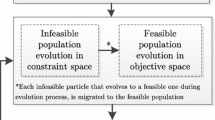Abstract
This paper presents an improved particle swarm optimization (IPSO) to solve constrained optimization problems, which handles constraints based on certain feasibility-based rules. A turbulence operator is incorporated into IPSO algorithm to overcome the premature convergence. At the same time, a set called FPS is proposed to save those P best locating in the feasible region. Different from the standard PSO, g best in IPSO is chosen from the FPS instead of the swarm. Furthermore, the mutation operation is applied to the P best with the maximal constraint violation value in the swarm, which can guide particles to close the feasible region quickly. The performance of IPSO algorithm is tested on a well-known benchmark suite and the experimental results show that the proposed approach is highly competitive, effective and efficient.
This work was supported in part by National Science Foundation of China under Grant NO.60674104 and by Natural Science Foundation of Shanxi Province of China under Grant NO. 20081030.
Preview
Unable to display preview. Download preview PDF.
Similar content being viewed by others
References
Coello Coello, C.A.: Theoretical and numerical constraint-handling techniques used with evolutionary algorithms: A survey of the state of the art. Comput. Meth. Appl. Mech. Eng. 191, 1245–1287 (2002)
Michalewicz, Z.: A survey of constraint handling techniques in evolutionary computation methods. In: Mcdonnell, J.R., Reynolds, R.G., Fogel, D.B. (eds.) Proceedings of the 4th Annual Conference on Evolutionary Programming, pp. 135–155. MIT Press, San Diego (1995)
Coello Coello, C.A.: Use of a self-adaptive penalty approach for engineering optimization problems. Comput. Ind. 41, 113–127 (2000)
Koziel, S., Michalewicz, Z.: Evolutionary algorithms, homomorphous mappings, and constrained parameter optimization. Evol. Comput. 7(1), 19–44 (1999)
Runarsson, T.P., Yao, X.: Stochastic ranking for constrained evolutionary optimization. IEEE Trans. Evol. Comput. 4(3), 284–294 (2000)
Kennedy, J., Eberhart, R.C.: Particle swarm optimization. In: Proceedings of the IEEE International Conference on Neural Networks, Piscataway, NJ, pp. 1942–1948 (1995)
Eberhart, R.C., Kennedy, J.: A new optimizer using particle swarm theory. In: Proceedings of 6th International Symposium on Micro Machine and Human Science, Nagoya, Japan, pp. 39–43 (1995)
Floudas, C.A., Pardalos, P.M.: A Collection of Test Problems for Constrained Global Optimization Algorithms. LNCS, vol. 455. Springer, Heidelberg (1990)
Himmelblau, D.M.: Applied Nonlinear Programming. McGraw-Hill, New York (1972)
Parsopoulos, K.E., Vrahatis, M.N.: Particle swarm optimization method for constrained optimization problems. In: Proceedings of the Euro-International Symposium on Computational Intelligence (E-ISCI 2002), Slovakia (2002)
Lu, H.Y., Chen, W.Q.: Self-adaptive velocity particle swarm optimization for solving constrained optimization problems. Journal of Global Optimization 41(3), 427–445 (2008)
Runarsson, T.P., Yao, X.: Stochastic ranking for constrained evolutionary optimization. IEEE Trans. Evol. Comput. 7, 19–44 (1999)
Toscano Pulido, G., Coello Coello, C.A.: A constraint-handling mechanism for particle swarm optimization. In: Proceedings of the 2004 Congress on Evolutionary Computation, vol. 2, pp. 1396–1403 (2004)
He, Q., Wang, L.: A hybrid particle swarm optimization with a feasibility-based rule for constrained optimization. Mathematics and Computation 186, 1407–1422 (2007)
Hu, X., Eberhart, R.C.: Solving constrained nonlinear optimization problems with particle swarm optimization. In: Proceedings of 6th World Multiconference on Systemics, Cybernetics and Informatics (SCI 2002), Orlando, USA (2002)
Zhang, W.J., Xie, X.F.: DEPSO: hybrid particle swarm with differential evolution operator. In: Proceedings of IEEE International Conference on Systems, Man and Cybernetics (October 2000); IEEE Trans. Evol. Comput. 4, 284–294 (2000)
Shi, Y.H., Eberhart, R.: A modified particle swarm optimizer. In: Proceedings IEEE International Conference on Evolutionary Computation, Anchorage, pp. 69–73 (1998)
Kennedy, J., Eberhart, R.C., Shi, Y.: Swarm Intelligence. Morgan Kaufman Publishers, San Francisco (2001)
Michalewicz, Z., Schoenauer, M.: Evolutionary algorithms for constrained parameter optimization problems. Evol. Comput. 4, 1–32 (1996)
Muñoz Zavala, A.E., Hernández Aguirre, A., Villa Diharce, E.R.: Constrained optimization via particle evolutionary swarm optimization algorithm (PESO). In: GECCO 2005, Washington, DC, USA, pp. 209–216 (2005)
Efrén, M.M., Coello Coello, C.A.: A simple multimembered evolution strategy to solve constrained optimization problems. Evolutionary Computation 4(1), 1–32 (1996)
Chang, J.F., Chu, S.C., Roddick, J.F., Pan, J.S.: A Parallel Particle Swarm Optimization Algorithm with Communication Strategies. Journal of Information Science and Engineering 21(4), 809–818 (2005)
Chu, S.C., Pan, J.S.: Intelligent Parallel Particle Swarm Optimization Algorithms. In: Nedjah, N., Alba, E., Macedo Mourelle, L. (eds.) Studies in Computational Intelligence Series, vol. 22, pp. 159–175. Springer, Heidelberg (2006)
Chu, S.C., Tsai, P.W., Pan, J.S.: Parallel Particle Swarm Optimization Algorithms with Adaptive Simulated Annealing. In: Abraham, A., Grosan, C., Ramos, V. (eds.) Studies in Computational Intelligence Series, vol. 31, pp. 261–279. Springer, Heidelberg (2006)
Author information
Authors and Affiliations
Editor information
Editors and Affiliations
Rights and permissions
Copyright information
© 2009 Springer-Verlag Berlin Heidelberg
About this paper
Cite this paper
Sun, Cl., Zeng, Jc., Pan, Js. (2009). An Improved Particle Swarm Optimization with Feasibility-Based Rules for Constrained Optimization Problems. In: Chien, BC., Hong, TP., Chen, SM., Ali, M. (eds) Next-Generation Applied Intelligence. IEA/AIE 2009. Lecture Notes in Computer Science(), vol 5579. Springer, Berlin, Heidelberg. https://doi.org/10.1007/978-3-642-02568-6_21
Download citation
DOI: https://doi.org/10.1007/978-3-642-02568-6_21
Publisher Name: Springer, Berlin, Heidelberg
Print ISBN: 978-3-642-02567-9
Online ISBN: 978-3-642-02568-6
eBook Packages: Computer ScienceComputer Science (R0)




